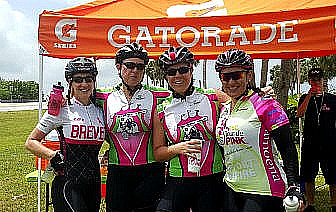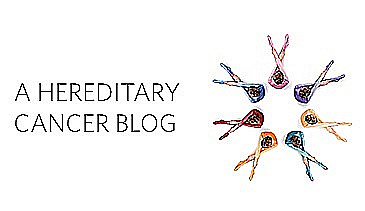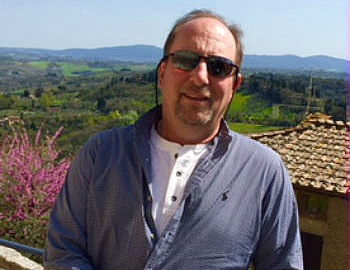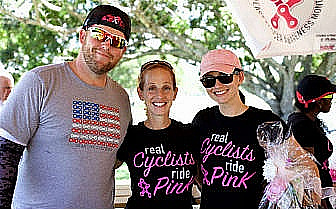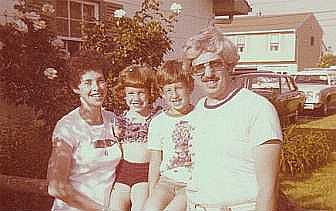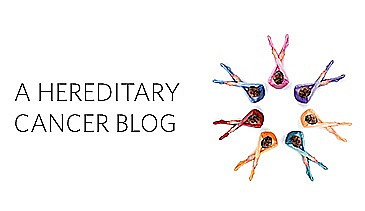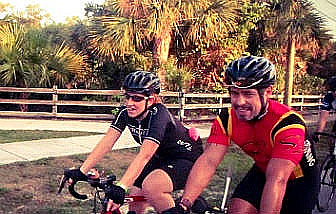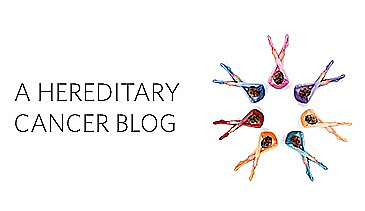- By Eve Mart
- Posted April 19, 2016
Ride Marshaling at YSC Tour de Pink South
As I said in my last post: ”Breast cancer survivors share a connection, and I’ve come to learn that in some unconscious way by helping others, I’m helping myself to heal and spin a positive out of something that was negative.” This past weekend, I had the honor of ride marshaling at the Young Survival Coalition’s (YSC’s) inaugural…
- By Michelle Jackson
- Posted April 14, 2016
Male breast cancer is rare, but it’s not that rarely inherited
When I was a clinical genetic counselor, I met with many men who had been diagnosed with breast cancer for genetic counseling and genetic testing. Counseling male breast cancer patients about genetics was often very different for me than counseling female breast cancer patients. I think the main reason for that is men and women are different and…
- By Bill Rotter
- Posted April 12, 2016
A Male Breast Cancer Perspective
Cancer is a difficult and tricky disease that tries to destroy us but now we are better prepared to fight back due to a stronger understanding of the disease. Cancer does not discriminate. As a male, the day I learned I had breast cancer was one of total disbelief and overwhelming shock. A diagnosis I was not prepared for. Sure, I knew men…
- By Eve Mart
- Posted March 29, 2016
Peer Support
I hadn’t set out to be the “go-to-girl” for all things breast cancer, but when you’re faced with a challenge and come out on the other side fairing pretty well, I think people trust you. Maybe they’re just looking for positive support wherever they can, when they find themselves in a similarly difficult spot. It starts with a phone call,…
- By Theresa Smith
- Posted March 8, 2016
These are my genetic test results... please don't shoot the messenger.
The initial shock from receiving my positive results for the BRCA2 gene mutation was now turning into "a low grade fever" of concern, which was my new reality. I already explained the news to my immediate family, but I started thinking about all the extended family members my result could affect, too. My extended family is large - over…
- By Eve Mart
- Posted March 1, 2016
Being a Survivor Doesn’t Mean You Can Ignore Me
My mom was first diagnosed with breast cancer in 1989, when breast cancer was still whispered about and long before Angelina Jolie put genetic testing on the Hollywood map. My mom complied with the treatment recommended for her at the time, which included a lumpectomy, chemotherapy and radiation. Eighteen years later, in 2007, I was 34 years old…
- By Theresa Smith
- Posted February 23, 2016
What about my “foobies” surgery?
I did finally come to terms with my decision to have a preventive bilateral mastectomy to lower my risk of breast cancer from my BRCA2 gene mutation. I was scheduled with my surgeon, but I was put on a rolling schedule, which meant my date was not set in stone. I asked at what point I got to keep my surgery date, instead of my date being…
- By Dr. Robina Smith
- Posted February 18, 2016
Following Positive/High Risk Patients and Survivors
According to the National Cancer Institute SEER (Surveillance, Epidemiology, and End Results) stat fact sheet on female breast cancer there were an estimated 12.3% of women living with breast cancer in the United States in 2012. 98.6% of breast cancer survivors diagnosed with early stage breast cancer are alive after 5 years or more. As early detection,…
- By Eve Mart
- Posted February 16, 2016
Treatment to Survivor
Being a breast cancer survivor isn’t a static label. For me, being a breast cancer survivor has added another layer to the person I am and have become, and that has been an evolutionary process. It took time to get my energy back, but I now happily maintain a very active lifestyle. Again, it took time, and patience was not my strong suit.…
- By Dr. Robina Smith
- Posted February 11, 2016
What to Expect from Surgery and Recovery
Whether a woman is facing the decision to have breast surgery as a treatment option for cancer or she is being proactive and having a preventive procedure done to reduce the risk of ever having cancer, the decision is not an easy one. Surgery can be a frightening experience for some people, and rightfully so. Although surgery is designed to physically…
